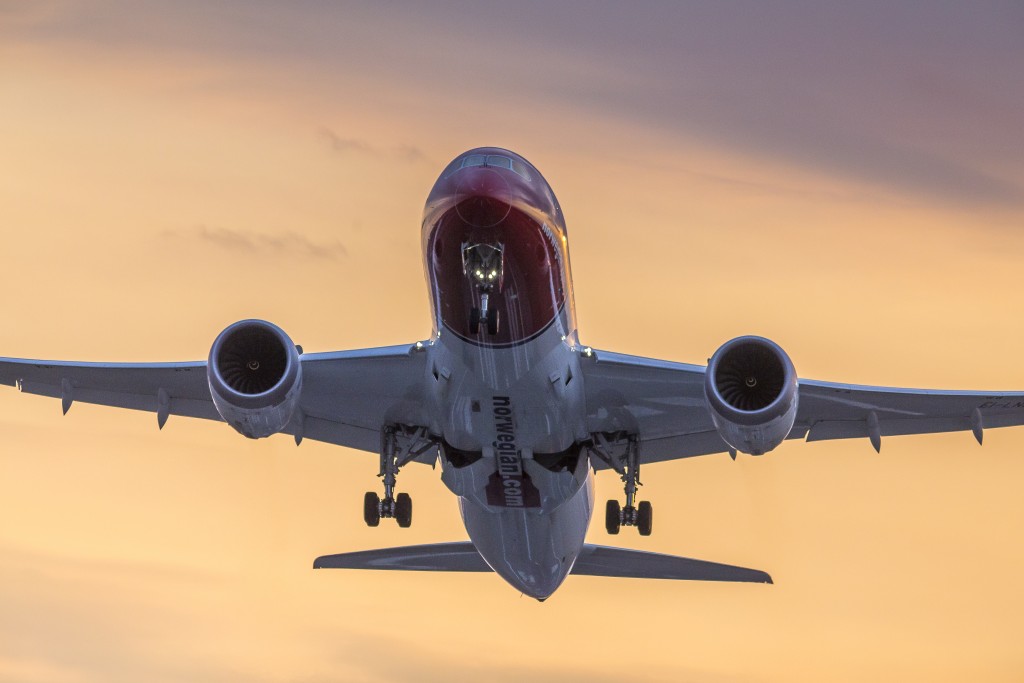New Swedish technology to support a greener aviation recovery
/ins Flying is like competition sailing: it is all about using good winds and avoiding unfavorable air currents. To allow airlines to fully use the favorable winds there is a new weather optimization service available that shows exactly how the wind blows and where there is bad weather in the atmosphere. With this knowledge airlines can save hundreds of tons of fuel per month which also means less emissions.

The best feature of the new optimisation service, delivered by AVTECH Sweden, is that airlines don’t have to make any investments to use it. All heavy calculations are made on the ground and just a small amount of data is uploaded to already existing onboard equipment.
Low cost airline Norwegian is acknowledged as one of the most fuel-efficient airlines in the world. The company is also one of the early adopters of AVTECH’s services, including tools to optimize the climb, cruise and descent phases for any single aircraft.
“By optimizing the different phases of a flight, we can easily avoid unnecessary use of the engines, which means fuel savings,”, says Norwegian pilot and project manager Stig Patey. “Just by flying smarter, we have counted an average fuel saving of 22 kg per flight in the descent phase and about 1.6 % in the cruise phase.”
At first glance it may not sound very much but multiplied by the 4.4 billion passenger flights that operated worldwide during 2018 pre covid-19, the overall fuel savings in the aviation industry in a normal year without a pandemic could be over 1.24 million tonnes per year. A saving that corresponds to the yearly CO2 emissions of around 300 000 Swedish households.
Today, things look very different as many airlines have been forced to heavily reduce their operation due to the pandemic and thus, for these companies, survival is paramount. With these potential savings in mind, when the travel situation begins to return to normal the Cruise Profile Optimizer is a great tool to return as a smarter and greener airline. Both saving money on fuel and heavily reducing emissions is achieved with very little effort from the airlines’ side.
“The savings we have achieved is good business for us and good news for the environment”, Patey says. “The best thing is that we did not have to invest in any new onboard equipment to achieve the reductions, since all calculations are delivered as a service individually to all aircraft.”
For the price of a cup of coffee
Among AVTECH’s other customers, are for instance Southwest Airlines, Easyjet and Eurowings. David Rytter, CEO of AVTECH, is sure that more airlines will sign up for the services now that the portfolio has expanded to cover all phases of the flight and proven to deliver as promised.
“The cost per flight for the weather service is about the price of a cup of coffee, while the saving is far greater, so the price tag should not be an obstacle”, Rytter says. “The aviation business is, however, generally speaking conservative and cautious with new ideas. But we are speaking with several interested airlines and I am confident that our services will be seen as a simple way for airlines to be more efficient and environmentally conscious. To further lower the threshold, AVTECH also offers a free trial period with a performance guarantee.”
AVTECH’s services have not come out of the blue. The company started as an aviation research institute almost 30 years ago and is now listed on Nasdaq First North in Stockholm. At the heart of the company’s services is the high definition weather data provided by Met Office in UK.
“As we have access to this data through a unique API, we are the only optimisation service that can offer a four-dimensional weather forecast with an accuracy of 10 km, compared to the normal global aviation weather grid of 140 km”, Rytter says. “It means that each individual flight can save fuel and reduce emissions simply by taking advantage of the best winds along the route, just like a sailboat seeking the best wind at sea.”
Similar Stories
DP World secures IATA certification for air freight services in Brazil
The new certification strengthens DP World’s ability to delivery secure, agile, and efficient air cargo transportation services
View Article
Jet set to Mexico City: WestJet’s new non-stop Calgary route set to take off in summer 2025
View Article
TAM Group expands operations in Latin America with new office in Mexico
View Article
New interagency study finds expansion of renewable energy production on federal lands could power millions more American homes
View ArticleEIA Short-Term Energy Outlook
This edition of our STEO is the first to include forecasts for 2026.
View Article
EIA publishes its first energy-sector forecasts through 2026
View ArticleGet the most up-to-date trending news!
SubscribeIndustry updates and weekly newsletter direct to your inbox!





